

Mobile phone boom in developing world could boost e-learning. Globalisation, as defined by the rich, is a very nice thing, the former US president Jimmy Carter once reflected.
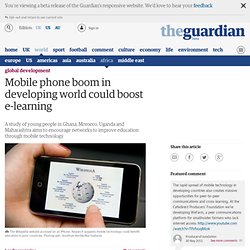
"You're talking about the internet, you're talking about cell phones, you're talking about computers," said Carter. "This doesn't affect two-thirds of the people in the world. " That was in 2001; a lot has changed. In Kenya, mobile phones have become an integral part of cash transfer schemes, enabling poor people in urban areas to buy food.
In remote rural areas of Peru, computers provided by the Euro-Solar programme are fuelling an appetite for learning among children. If the global spread of technology can do all this, what else might it achieve? Shaping the future – realising the potential of informal learning through mobile (pdf), explores mobile technology's potential to improve access to education for young people in developing countries. Mobile phones are increasingly ubiquitous in poor countries, which now account for four in every five connections worldwide (pdf).
Clay Shirky: How the Internet will (one day) transform government. From Gutenberg to Google: New media? New journalism. In 1997, Time-Life Magazine voted the printing press the most important invention of the last thousand years.
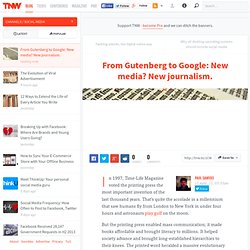
That’s quite the accolade in a millennium that saw humans fly from London to New York in under four hours and astronauts play golf on the moon. But the printing press enabled mass communication; it made books affordable and brought literacy to millions. It helped society advance and brought long-established hierarchies to their knees. The printed word heralded a massive evolutionary step for the information age. Johannes Gutenberg probably didn’t know he was changing the world forever, but when he developed the printing press in the mid-15th century, he paved the way for the mass circulation of books, instructions, manuals, journals and, of course, newspapers.
And here we are, over 500 years later, and the printing press looks like it has finally met its match. Old media, meet new media A seasoned campaigner comes up against a young upstart that’s slicker, and faster on the draw. Helen Skelton quits Twitter after abuse from trolls. Blue Peter presenter Helen Skelton decided on Thursday that the abuse had simply become too much too take.
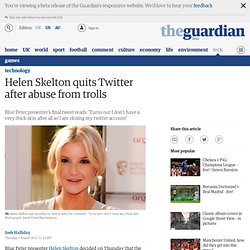
With a final sign-off to her 40,000 followers, she said goodbye to Twitter. "Turns out I don't have very thick skin after all so I am closing my twitter account. Enjoy the games. Signing off, skelts x. " A day earlier, it had been the turn of Channel 4 presenter Kirstie Allsopp to air her frustration with so-called trolls posting abuse to her on Twitter. Allsopp refused to leave the social network over the comments, but told her 235,000 followers: "I will not accept being told to shoot my own womb or bleed to death with a spade in my vagina by anyone. The presenter, who fronts Location, Location, Location for Channel 4, said there should be a way to tackle internet trolls without calling in the police.
There appears to be a growing wave of abuse targeting high-profile personalities on Twitter, prompting heated debate about free expression on the internet. Young people need guidance to cope with the threats posed by social media. This week marks the first anniversary of the summer riots, where mobile devices played such an important part in connecting rioters with each other and were used to capture much of the carnage and brutality.
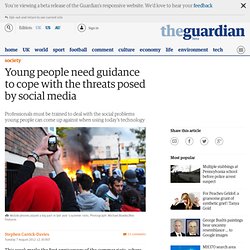
Of course, the technology didn't cause the riots, but as the police found out, BlackBerry Messenger (BBM) helped crowds gather at remarkable speed and to circumvent police lines. A year is a long time in terms of technology. New mobile handsets and apps become integrated into our lives at astonishing speed. Over the last 12 months I've been working with young people excluded from mainstream schools who are taught instead in pupil referral units (PRUs).
I'd never boast about it, but I'm a master of the new art of underbragging. Ever so 'umble: but then at least Usain Bolt really is better than everyone else.
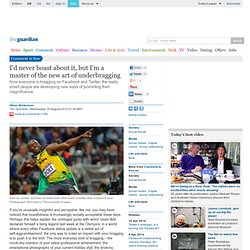
Photograph: McClatchy-Tribune/Getty Images If you're unusually insightful and perceptive, like me, you may have noticed that boastfulness is increasingly socially acceptable these days. Perhaps this helps explain the unhinged gusto with which Usain Bolt declared himself a living legend last week at the Olympics: in a world where every other Facebook status update is a veiled act of self-aggrandisement, the only way to make an impact with your bragging is to push it to the limit.
Does your school use Facebook or other social media to communicate or teach? Is your school administration or your school’s PTA using Facebook to communicate with parents?
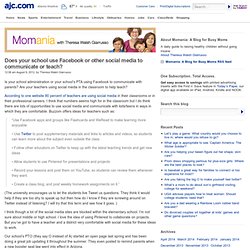
Are your teachers using social media in the classroom to help teach? According to one website 90 percent of teachers are using social media in their classrooms or in their professional careers. I think that numbers seems high for in the classroom but I do think there are lots of opportunities to use social media and communicate with kids/teens in ways in which they are comfortable. Buzzom offers ideas for teachers such as: Social Media Is Becoming Useful, Finally. Gustavo Razzetti | December 25, 2012 | 2 Comments inShare33 A new tool is looking to change your social media experience by allowing you to pull and save parts of the web that you care about.
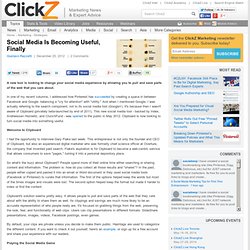
In one of my recent columns, I addressed how Pinterest has succeeded by creating a space in between Facebook and Google: balancing a "cry for attention" with "utility. " Future - Technology - Rethinking the social network. It’s not how many friends you have in your social circles but who you are friends with that matters, argues columnist Tom Chatfield.
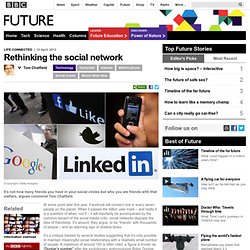
At some point later this year, Facebook will connect one in every seven people on the planet. When it passes the billion user mark – and really it is a question of when, not if – it will inevitably be accompanied by the common lament of the social media critic: social networks degrade the idea of friendship. Don’t ban social media from schools. By Steve Nicholls, Special to CNN Editor’s note: Steve Nicholls is the author of Social Media in Business.
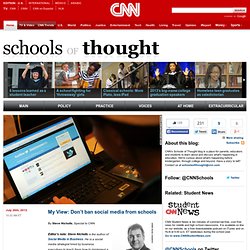
He is a social media strategist hired by business executives to teach them how to implement a winning social media strategy into their organization. Don't let e-safety worries be a barrier to using social media in school. Using social media in school doesn't have to cause e-safety panics.
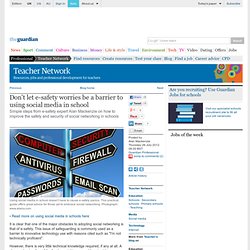
This practical guide offers great advice for those yet to embrace social networking. Photograph: www.alamy.com. Social media is more than simply a marketing tool for academic research. According to Jeff Jarvis, author of Public Parts: How Sharing in the Digital Age Improves the Way We Work and Live, thanks to the internet, "we all have our Gutenberg presses and the privileges they accord. " For academic institutions, the internet is a largely untapped resource for shaping and sharing scholarly research. As with the Gutenberg press, maybe professors are worried about permanently penning their ideas into cyberspace. Others may worry about privacy, especially regarding social networking. Social media for schools: a guide to Twitter, Facebook and Pinterest.
• For advice on e-safety in schools, click here The use of social media in education continues to be something of a hot topic with arguments both for and against. So I carried out a small survey of 27 teaching professionals in order to create a baseline of understanding into the use (or not) of social networking in schools, and also any concerns over some of the e-safety risks. The full survey results can be found here. There are many uses of social media in education - below are just a few of the ways they can be effectively used. A Teacher’s Guide To Social Media [INFOGRAPHIC]
Digital media get top marks as they bring a new kind of learning into the classroom - Education. Given that, it's hardly surprising that digital and social media are becoming more and more widely used in schools and universities. In fact, institutions around the UK are bringing students new learning experiences via digital media. A recent example saw 9,000 students from 140 schools watch a webcast of Tim Crouch's play I, Cinna, based on the misadventures of a lowly character from Shakespeare's Julius Caesar, then writing their own poems and prose in response and taking part in a live Q&A with the actor and director.
The project was the result of a collaboration between Cisco, the Royal Shakespeare Company, JANET (a government-funded research and education network) and university sector college Ravensbourne. The Q&A session was hosted by former Blue Peter presenter Konnie Huq, and many of the students taking part, aged 11-16, had never been to the theatre or written poetry. Being Twitter-literate can have unexpected advantages. Making Shakespeare relevant in the digital age. Teachers need advice on social networking. Released 02/08/2012 With 14 teachers suspended as a result of their social media activity and 18 more placed on probation; it's more important than ever for schools to provide up to date guidelines for staff, advises iTeachingResources.com.